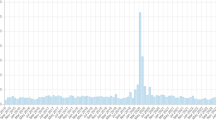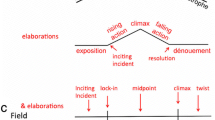Abstract
Computer games have not beenadequately theorized within the humanities. Inthis paper a brief history of computer games ispresented as a starting point for developing atopology of games and a theory of computergames as rhetorical artifacts suitable forcritical study. The paper addresses thequestion of why games should be treatedseriously and suggests a theoretical approachbased on Bakhtin's poetics of the novel wherethe experience of time and space (thechronotope) provides a framework of questionsfor discussing computer games.
Similar content being viewed by others
References
Aarseth E. (1997) Cybertext; Perspectives on Ergotic Literature. John Hopkins University Press, Baltimore.
Anderson C., Dill, K. (2000) Video Games and Aggressive Thoughts, Feelings, and Behavior in the Laboratory and in Life. Journal of Personality and Social Psychology, 78/4, pp. 772–790.
Bakhtin M.M. (1981) In Holquist,M. (ed.), The Dialogic Imagination: Four Essays by M.M. Bakhtin, Trans. Caryl Emerson and Michael Holquist, University of Texas Press, Austin.
Bakhtin M.M. (1986) In Holquist M. (ed.), Speech Genres and Other Late Essays, Trans. VernW. McGee, University of Texas Press, Austin.
Burnham V. (2001) Supercade: a Visual History of the Videogame Age, 1971–1984, MIT Press, Cambridge, Massachusetts.
Classic Gaming (1998) The Museum of Classic Games and Classic Gaming Systems. [http://www. classicgaming.com/museum/] Accessed December.
Coover R. (1993) Hyperfiction: Novels for the Computer. The New York Times Book Review, August 29, pp. 1, 8–12.
Dill K., Dill J. (1998) Video Game Violence: A Review of the Empirical Literature. Aggression and Violent Behavior, 3/4, pp. 407–428.
Hafner K., Lyon M. (1996) Where Wizards Stay Up Late: The Origins of the Internet. Simon & Shuster, New York.
Landow G.P. (1992) Hypertext: The Convergence of Contemporary Critical Theory and Technology. The John Hopkins University Press, Baltimore.
McLuhan M. (1964) Understanding Media: The Extensions of Man. Routledge, London.
Morrison M. (1994) TheMagic of Interactive Entertainment. Sams Publishing, Indianapolis, Indiana.
Provenzo E.F. (1991) Video Kids: Making Sense of Nintendo. Harvard University Press, Cambridge Massachusetts.
Randall N. (1988) Determining Literariness In Interactive Fiction. Computers and the Humanities, 22/3, pp. 183–191.
Renear A. (1995) Understanding hyper(Media): Required Readings. Computers and the Humanities, 29, pp. 389–40
Author information
Authors and Affiliations
Rights and permissions
About this article
Cite this article
Rockwell, G. Gore Galore: Literary Theory and Computer Games. Computers and the Humanities 36, 345–358 (2002). https://doi.org/10.1023/A:1016174116399
Issue Date:
DOI: https://doi.org/10.1023/A:1016174116399




